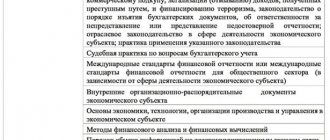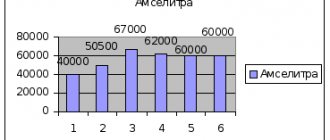General provisions
1.1. This job description defines the job duties, rights and responsibilities of an economist.
1.2. An economist belongs to the category of specialists.
1.3. For the position:
- An economist is appointed a person who has a higher professional (economic) education without presenting requirements for work experience, or a secondary vocational (economic) education and work experience as a category I technician for at least three years or other positions filled by specialists with a secondary vocational education for at least five years ;
- economist of category II - a person with a higher professional (economic) education and work experience in the position of economist or other engineering and technical positions filled by specialists with higher professional education for at least three years;
- Category I economist - a person who has a higher professional (economic) education and work experience as a Category II economist for at least three years.
Appointment to the position of economist and dismissal from it is made by the director of the enterprise upon the recommendation of ________________ (the head of the structural unit (other official) to whom the employee is subordinate).
1.4. An economist should know:
- Legislative acts, regulations, instructions, orders, other regulations, methodological materials on planning, accounting and analysis of enterprise activities.
- Organization of planned work.
- The procedure for developing long-term and annual plans for the economic, financial and production activities of the enterprise.
- The procedure for developing business plans.
- Planning and accounting documentation.
- The procedure for developing standards for material, labor and financial costs.
- Methods of economic analysis and accounting of performance indicators of an enterprise and its divisions.
- Methods for determining the economic efficiency of introducing new equipment and technology, labor organization, rationalization proposals and inventions.
- Methods and means of carrying out computational work.
- Rules for preparing materials for concluding contracts.
- Organization of operational and statistical accounting.
- The procedure and deadlines for drawing up established reports.
- Domestic and foreign experience in the rational organization of economic activity of an enterprise in a market economy.
- Economics, organization of production, labor and management.
- Basics of production technology.
- Market methods of management.
- Rules for the operation of computer technology, the possibility of its use for carrying out technical and economic calculations and analyzing the economic activities of an enterprise.
- Labor legislation.
- Internal labor regulations.
- Labor protection rules and regulations.
1.5. An economist is guided in his activities by:
- Regulations on _____________ (structural unit).
- This job description for an economist.
1.6. The economist reports directly to ________________ (the head of the relevant structural unit).
1.7. During the absence of the economist (vacation, illness, etc.), his official duties are performed by a person appointed in the prescribed manner, who acquires the corresponding rights and is responsible for the proper performance of the official duties of the economist assigned to him.
The future of the profession
There is no reason to worry that the specialty will become outdated and disappear as unnecessary. In the near future, economists will be needed in small and large businesses, in the financial and banking sectors. Insurance companies, state-owned enterprises, and transnational corporations need them.
For your career, it is better to get a “paired” position. For example, an economist - financier, analyst or engineer. You can work in different areas - production, marketing, logistics, innovative technologies, quality management, consulting.
Job responsibilities
2.1. Economist:
- Performs work to implement the economic activities of the enterprise, aimed at increasing the efficiency and profitability of production, the quality of products and the development of new types, achieving high final results with the optimal use of material, labor and financial resources.
- Prepares initial data for drawing up projects for economic, financial, production and commercial activities (business plans) of the enterprise in order to ensure growth in product sales and increase profits.
- Performs calculations on material, labor and financial costs necessary for the production and sale of products, the development of new types of products, advanced equipment and technology.
- Carries out an economic analysis of the economic activities of the enterprise and its divisions, develops measures to ensure economy, increase production profitability, competitiveness of products, labor productivity, reduce production and sales costs, eliminate losses and unproductive expenses, as well as identify opportunities for additional production.
- Determines the economic efficiency of the organization of labor and production, the introduction of new equipment and technology, rationalization proposals and inventions.
2.2. Participating:
- In reviewing developed production and economic plans.
- In carrying out work on resource conservation.
- In the implementation and improvement of on-farm accounting.
- In improving progressive forms of labor organization and management.
- In improving planning and accounting documentation.
2.3. Prepares materials for concluding contracts, monitors deadlines for fulfilling contractual obligations.
2.4. Monitors the progress of implementation of planned targets for the enterprise and its divisions, and the use of on-farm reserves.
2.5. Participates in conducting marketing research and forecasting production development.
2.6. Performs the necessary work related to non-routine settlements and monitoring the correctness of settlement transactions.
2.7. Keeps records of economic indicators of the results of production activities of the enterprise and its divisions, as well as records of concluded contracts.
2.8. Prepares periodic reports within established deadlines.
2.9. Performs work on the formation, maintenance and storage of a database of economic information, makes changes to reference and regulatory information that is used in data processing.
2.10. Participates in the formation of the economic formulation of problems or their individual stages, solved with the help of computer technology, determines the possibility of using ready-made projects and algorithms. Application software packages that allow you to create economically sound systems for processing economic information.
2.11. Studies special literature related to the work performed, as well as on the topics of ongoing research and development, compiles various economic justifications, certificates, periodic reports, annotations and reviews.
2.12. Performs individual official assignments from his immediate superior.
Job description of the chief economist of the enterprise
The chief economist is assigned a category - specialist. He reports to the financial and general director. If the chief economist is absent, another employee is assigned to perform his functional duties, along with responsibilities and rights, in accordance with internal regulations.
An employee with a higher economic education and experience in similar work activities is appointed to this position for a period of at least one year. Only the general director has the right to appoint an employee as chief economist, as well as to release him from performing such duties, in accordance with his own issued order. The economist performs his work according to the following documents:
- principles of job description;
- management installed in the company;
- the charter of the enterprise;
- orders of the head of the organization;
- regulatory legislative acts of the Russian Federation;
- methodological data on the implementation of the labor process.
- internal rules of labor discipline;
The chief economist is required to have the following knowledge:
- methods for creating economically effective use of the latest technological means of production and discoveries, creating a labor process.
- the procedure for performing statistical and operational registration;
- conditions for the formation of annual economic, production, financial projects of the enterprise;
- methodological information related to planning, analysis, accounting of the company’s work;
- business planning procedure;
- regulations, legislative rules, orders, instructions, other regulations;
- rules of preparatory measures for expenditure standards for material, labor and financial resources;
- conditions, deadlines for developing the necessary reports;
- methods of economic assessment, monitoring the performance of each department of the enterprise;
- planning and accounting documents;
Contents of the article The work of the chief economist is regulated by relevant documentation.
3. Rights
3.1. An economist has the right:
- Get acquainted with the draft decisions of the enterprise management concerning its activities.
- Submit proposals for improvement of work related to the responsibilities provided for in these instructions for consideration by management.
- Within your competence, inform your immediate supervisor about all shortcomings identified in the course of your activities and make proposals for their elimination.
- Involve specialists from all (individual) structural divisions in solving the tasks assigned to him (if this is provided for by the regulations on structural divisions, if not, then with the permission of the manager).
- Request personally or on behalf of the management of the enterprise from the heads of structural divisions and specialists information and documents necessary to fulfill his official duties.
- Require the management of the enterprise to provide assistance in the performance of their official duties and rights.
sovetnik36.ru
The job responsibilities of an economist are primarily the development and coordination of tasks that are based on the preparation of statistical reports and documentation.
The activities of such a specialist are based on the job description, which is drawn up when hiring, and the orders of the head of the company. Let us consider in more detail the functional responsibilities of an economist.
The main task is to carry out economic activities that are aimed at improving the enterprise, improving product quality, and optimal use of resources. In addition, this specialist calculates the material, financial and labor costs that are necessary for the production of goods and its sale, and the development of new technologies.
Attention Carry out, within the framework of the employment contract, the orders of the employees to whom he is subordinate in accordance with these instructions.
3. Rights of an economist The economist has the right: 1. To submit proposals for consideration by the director of the organization:
- on the encouragement of distinguished employees subordinate to him,
- on bringing to material and disciplinary liability the employees subordinate to him who violated production and labor discipline.
- to improve work related to the responsibilities provided for in this instruction,
2. Request from structural divisions and employees of the organization the information necessary for him to perform his job duties.
3. Get acquainted with the documents defining his rights and responsibilities for his position, criteria for assessing the quality of performance of official duties. 4. Appointed to the position of: - category I economist is a person with a higher professional (economic) education and at least years of work experience as a category II economist; - economist of category II - a person with a higher professional (economic) education and work experience as an economist or other engineering and technical positions, filled by specialists with a higher education
Responsibility
4.1. The economist is responsible for:
- Improper performance or failure to fulfill one’s job duties as provided for in this job description - within the limits determined by the current labor legislation of Russia.
- Offenses committed in the course of carrying out their activities - within the limits determined by the current administrative, criminal and civil legislation of Russia.
- Causing material damage - within the limits determined by the current labor and civil legislation of Russia.
I have read the job description of an economist: ____________________
Information on document execution is presented on the basis of the legislation and regulations of the Russian Federation in force in 2017
How much does he earn
Qualified specialists earn good money. Yesterday's university graduate will need more than one year to achieve this.
Economists earn the most in Moscow - 53,000 rubles, the average income in Russia is just over 32,000 rubles. The average salary of an economist in construction is 60,000 rubles, in planning departments of companies and enterprises in other industries - 53,750 rubles. The salary of the chief economist is 50,000 rubles.
According to the website russia.trud.com, for half of the available vacancies, employers indicated a salary in the amount of 20 to 40 thousand rubles, for 28% - in the range from 40 to 60 thousand rubles. In general, an economist’s income depends on several components: region, place of employment and the number of responsibilities. The spread due to this can be impressive.
Career steps and prospects
To gain extensive experience, it is better for a novice economist to start working in a small enterprise. Here he will quickly become acquainted with the real state of affairs in the Russian economy and organization in particular. From the first days he will have to solve a whole range of problems, and not work in one direction. The career growth of an economist is to achieve the position of chief economist, and subsequently, financial director, subject to a high level of development of management competencies.








